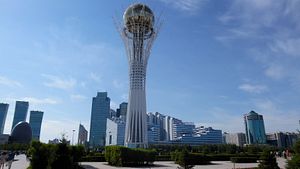On Monday, a court in Astana sentenced Seitqazy Mataev, head of the Kazakh Journalists Union, and his son Aset, director of the KazTag news agency, to six and five years respectively. The father and son duo were convicted of embezzlement and tax evasion, charges which rights groups say were trumped up to silence the journalists.
In February–a month before snap parliamentary elections–the father and son duo were arrested. The younger Mataev was released after a few hours and 61-year-old Seitqazy transferred to house arrest. While Aset was not named in the initial press release from the state anti-corruption service outlining the charges against his father, he was re-arrested a month later on companion charges and also placed under house arrest. Though the charges were filed in Almaty, the two were transferred to an apartment in Astana while the court case proceeded.
The charges against the Seitqazy Mataev, who is also president of Kazakhstan’s National Press Club and counts its building in Astana among his properties, alleged that he had embezzled 380 million tenge from a contract to promote national policies between KazakhTelecom and the National Press Club and KazTag. Additional charges allege that Seitqazy didn’t pay 327 million tenge in taxes related to an illegal, and unnamed, enterprise.
Although the Mataev’s were both under house arrest by the end of March, the trial did not begin until late August. The elder Mataev was taken to the hospital three times–delaying the trial–for issues related to high blood pressure.
The Committee to Protect Journalists, in a release ahead of the final sentencing, outlined the charges and commentary regarding the case. In addition to prison terms, authorities asked for the seizure of the Mataev’s property, CPJ reported. The CPJ also noted that local reports say that the authorities also asked to ban Aset from business activities for three years following his eventual release from prison.
Nina Ognianova, CPJ’s Europe and Central Asia program coordinator, said, “The Kazakh government is only shaming itself with this prosecution and detention of a father-son team of independent journalists.”
The Mataev’s have described the charges against them as retaliatory and politically motivated. Aset told CPJ in February, “We always reported the truth. [We] depicted the facts about developments in Kazakhstan as they really were. Someone in power did not like it.”
Daniil Kislov, chief editor of the Moscow-based independent regional news website, Ferghana, told CPJ that Mataev is “an iconic figure in Kazakhstan’s journalism.”
Kislov told CPJ the National Press Club and KazTag agency were “the last platforms for expressing free and independent voices in Kazakhstan.” He also said that, in his opinion, “The authorities are behind the prosecution. They want to turn KazTag, the country’s largest news agency, into a propaganda machine.”
Kazakhstan has engaged in targeted takedowns of independent media outlets over the last few years.. The most prominent and wide-ranging has been Astana’s pursuit of the editors of Respublika, a newspaper that published leaked government documents in 2014. Kazakhstan has followed the Respublika case into the U.S. court system, though has not met with much success. In August, researchers from the Electronic Frontier Foundation (EFF) said that Kazakh authorities had hired Indian hackers to run a phishing and malware campaign targeting journalists, dissidents, their family, and their lawyers.
As Kazakhstan has been buffeted by tough economic headwinds Astana has remained uncomfortable with internal criticism. Protests in the spring were shut down firmly, though thankfully without bloodshed, while the underlying issues remain largely unaddressed.

































